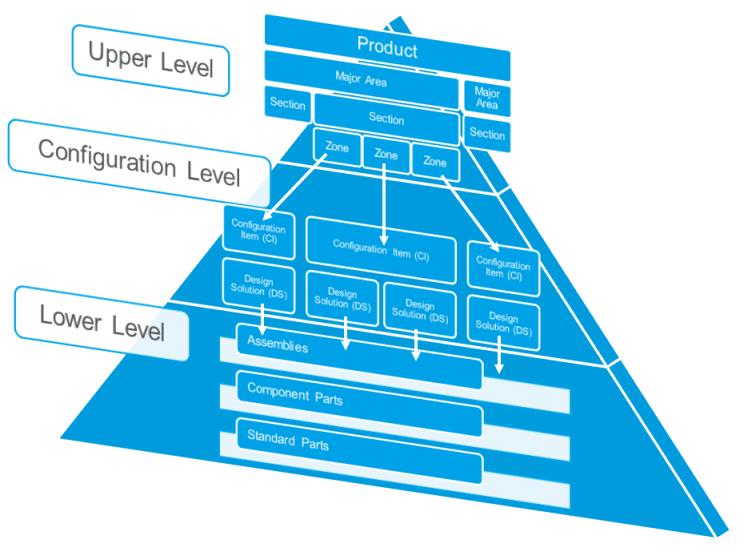Product Structure
The Windchill Aerospace & Defense configuration management capabilities include an optional out-of-the-box product structure that is optimized to represent the hierarchical breakdown of the business and technical information involved in the enterprise development of an aerospace and defense product. For more information about the product context, see About Products.
Product Structure Overview
The following levels of the product structure are designed to manage product information according to the requirements of your site and the product components involved:
• Upper Level — Includes information regarding the high-level hierarchy of a product, represented by its major areas, sections, zones, or other object designations your site prefers. Generally, the upper level structure is determined early and rarely changes once it has been established.
• Configuration Level — Includes information regarding the functional elements that form the product. The configuration level of the product structure identifies points of configuration management and addresses how to meet their functional requirements.
• Lower Level — Includes information regarding the physical assemblies, component parts, and standard parts that go into the design and manufacturing of the product.
Each level defines specific configurations and includes its own structure.
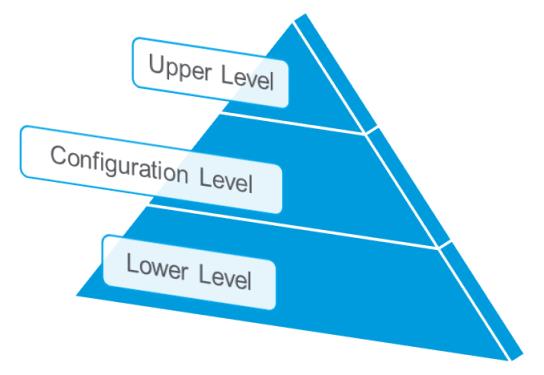
Other product structure configurations are possible, but the out-of-the-box features enable your site to most effectively manage the behaviors and relationships of different objects in a product. |
Upper Level Structure
The upper level of the product structure is the high-level hierarchy of a product, represented by its major areas, sections, zones, or other object designations set by your site. Generally, the upper-level structure is determined early and rarely changes once it has been established. The upper level of the product structure is flexibly designed to accommodate the varied purposes of any site and any type of product. Specifically, the organization of the objects within the upper level of the product structure can be defined according to hierarchical or other relationship requirements.
Upper-Level Objects and Structure Example
Windchill Aerospace & Defense configuration management includes a base upper level object type that can be used out of the box. However, you can create any number of upper-level object types and define any configuration of parent-child relationships between them.
For example, in the diagram below, the following objects for the upper level of a product are defined:
• Major Area—The highest-level object of the upper level product structure.
• Section—Only a section can be a child of a major area. A section cannot be a child of any other object type.
• Zone—Only a zone can be a child of a section. A zone cannot be a child of any other object type.
• Configuration Item—Since a zone is the lowest object in the upper level, only a zone can be the parent of a configuration item (from the configuration level). A configuration item cannot be the child of any object type other than a zone.
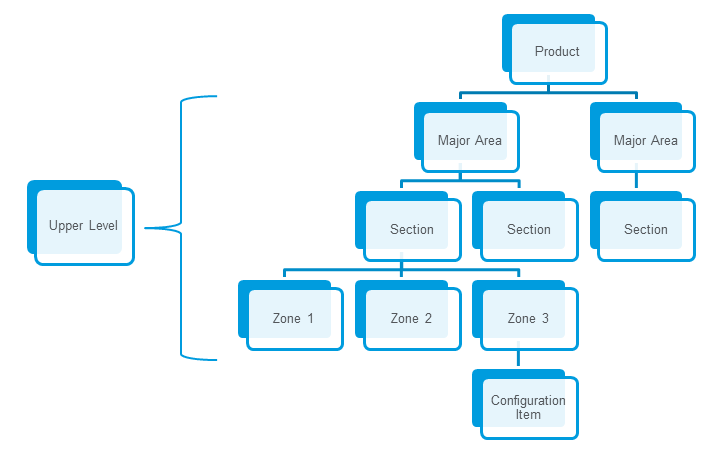
For more information, see Configuration Management Objects: Windchill Parts.
Configuration Level Structure
The configuration level of the product structure identifies points of configuration management and addresses how to meet their functional requirements. The organization and information of the configuration level are defined by the following objects:
• Configuration Item (CI)—Represents a functional element of the product and corresponds to a configuration management point in the product structure.
• Design Solution (DS)—Represents a technical response to a configuration item. A design solution describes an implementation that addresses the functional requirements of an associated configuration item.
This configuration level structure overview describes the optional out-of-the-box product structure configuration. Windchill Aerospace & Defense Configuration Items and Design Solutions also supports a product structure configuration that uses an object called the Link Object (LO). For more information about the product structure configuration using the link object, see Configuration Level Structure with the Link Object. |
You can create object types for the upper and lower levels of a product structure in any number and with any configuration of parent-child relationships. However, object types created at the configuration level must be defined as either configuration items or design solutions.
As illustrated below, a configuration item is the child of an upper-level object, representing the functional element to be defined and configured.
The design solution describes how the functional requirement is addressed. Its children are the parts and assemblies within the lower-level product structure that are necessary to fulfill the design solution.
A configuration item can have multiple design solutions (each representing a different serial number range for the product). Additionally, you can use a design solution to address more than one configuration item.
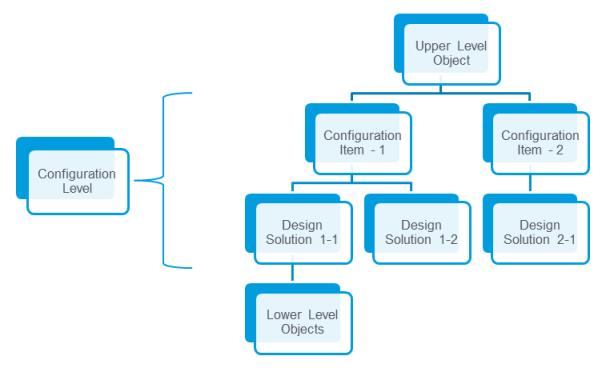
The configuration level of the product structure includes many details and features that are used for configuration and change management. For a more detailed description of these features, see Configuration Level Details.
Lower Level Structure
The lower level of the product structure includes the physical assemblies, component parts, and standard parts that go into the design and manufacturing of the product. These objects represent the actual physical parts that you design, purchase, and manufacture, as well as the services for the products that are delivered to the customer.
The lower level of the product structure is flexibly designed to accommodate the varied purposes of any site and any type of product. Specifically, the organization of the objects within the lower level of the product structure can be defined according to any hierarchical or other relationship requirements.
Lower-Level Objects and Structure Example
Although Windchill Aerospace & Defense configuration management includes a base lower-level object type that can be used out of the box, you can create any number of lower-level object types and define any configuration of parent-child relationships between them.
For example, in the diagram below, the following objects are defined for the lower level of a product:
• Assembly—An assembly is the highest level object of the lower-level product structure. Only an assembly can be the child of a design solution from the configuration level. An assembly can have a child with an object type of Assembly, Component Part, or Standard Part.
• Component Part and Standard Part—These objects can only be the child of an assembly and no other object type.
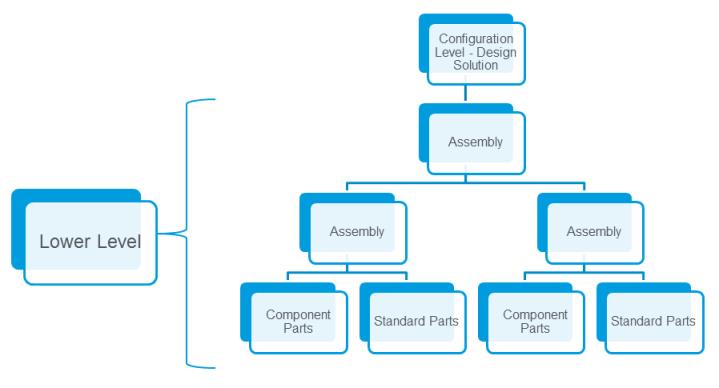
Detailed Product Structure Example: Fitting it All Together
The following diagram details the overall product structure using the upper and lower level structure and object examples from above:
